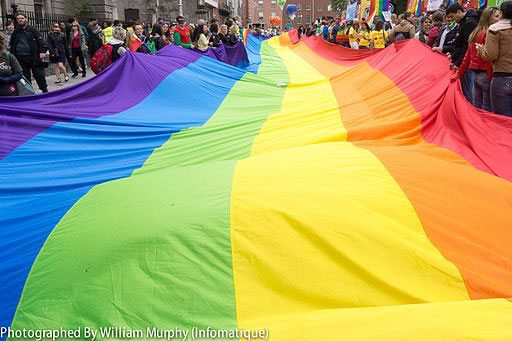
July 11, 2017; Washington Post
Would it be impolitic to equate the struggle for human and equal rights in today’s political environment to a relay race? Instead of the usual individual effort, in a relay race, each team member is responsible for a portion of the race, moving the baton to the next phase. That way, no one is overextended and each team member can apply their specific skills to hustle toward the finish line. In this case, anyone of the social justice, progressive, liberal, libertarian or Democratic Party persuasion who needs a brief hiatus from the front lines might find that the LGBTQ rights and equal rights communities are in place to take up the lead.
The Human Rights Campaign, “America’s largest civil rights organization working to achieve lesbian, gay, bisexual, transgender and queer equality,” has orchestrated a series of high-profile political wins, boasts impressive membership numbers (and even more supporters), and, most importantly, has amassed a $26 million war chest.
For the 2018 election cycle, the LGBTQ community is woke and poised to play. Collectively, they have used their voices and partners to make appreciable dents in barriers to full and equal rights, even knocking some down. When the dust from the great bathroom debate/debacle settled, the law’s chief proponent, the Republican governor of North Carolina, had lost his office and platform. Losing this governorship was not all the state lost. The more than 10 million supporters of equal rights effectively lobbied other states’ politicians, teams, and organizations, making North Carolina a national pariah. The state is believed to have lost as much as $201 million in tourism and revenue. Success breeds success, and the organization has developed a well-funded strategy. Recognizing that “all politics are local,” they are focused on 20 other states and their governorship and legislatures, believing they are the next equal rights battlegrounds.
Sign up for our free newsletters
Subscribe to NPQ's newsletters to have our top stories delivered directly to your inbox.
By signing up, you agree to our privacy policy and terms of use, and to receive messages from NPQ and our partners.
When it comes to relay races, the strategy is to run one’s second-fastest, third-fastest, slowest, and fastest racers—in that order. There is a method to the relay race madness. Each leg is different; some are shorter than others, but the last leg usually calls for the strongest runner. Progressives and liberals have been running variations of these races for a long time, and it’s likely that every conceivable faction of the coalition has served in every position. The Democratic/liberal progressive team took a massive hit in the Clinton/Trump race; today, they are reeling from four high-profile special election losses. Does that mean the DNC should widen its prospects? Well, look at the abundance of potential leadership, active members of the rank and file who have earned and deserve a seat at the big table. Absent this, progressive Democrats run the risk of alienating their base, which comprises a significant amount of the LGBTQ community.
The collective gay community sees within itself a cross-section of every group that has been spat on, discriminated against, lynched, killed, beat up, bullied, and made to wear stupid dresses. They are right. They are gay African Americans, Asians, Latin@s, Caucasians, young people, seniors, women, men, trans folk, and queers of all stripes—and, most importantly, they are coming of age with their potential.
Liberals and progressives from outside the LGBTQ community may find it prudent to accept the advantages of a movement in rebirth. Extant nonprofits working in the space should continue stepping up, mentoring, supporting, and guiding. As members of the community are doing work on the ground, the nonprofits should be handling the legal, administrative, and paperwork details. It appears clear that volunteers will not settle for being on the sidelines. With their accomplishments and success, there’s no reason they should.—Mary Frances Mitchner













